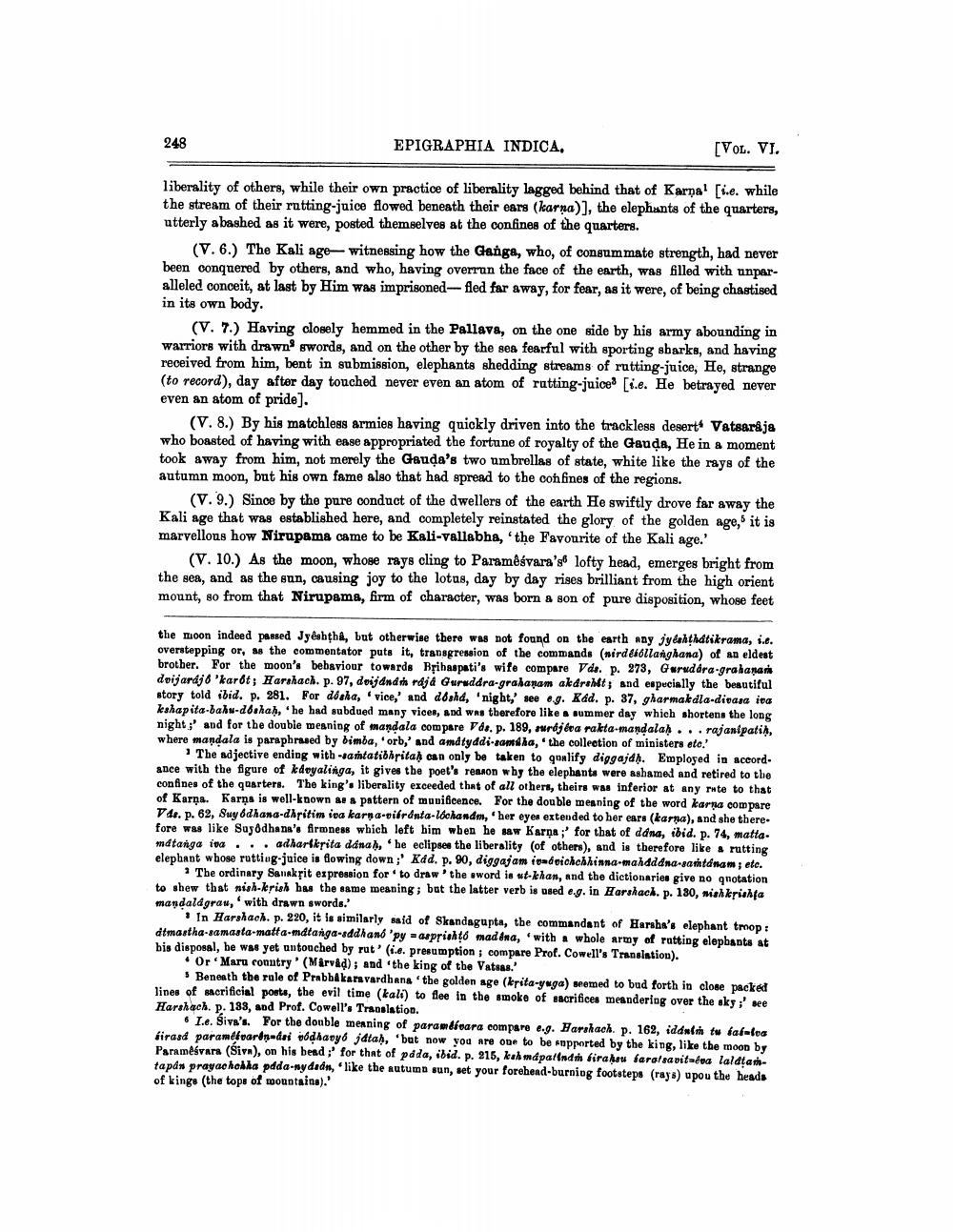________________
248
EPIGRAPHIA INDICA,
[VOL. VI.
liberality of others, while their own practice of liberality lagged behind that of Karnal [se. while the stream of their rutting-juice flowed beneath their ears (karna)], the elephants of the quarters, utterly a bashed as it were, posted themselves at the confines of the quarters.
(V. 6.) The Kali age-witnessing how the Ganga, who, of consummate strength, had never been conquered by others, and who, having overrun the face of the earth, was filled with unparalleled conceit, at last by Him was imprisoned-fled far away, for fear, as it were, of being chastised in its own body.
(V. 7.) Having closely hemmed in the Pallave, on the one side by his army abounding in warriors with drawn swords, and on the other by the sea fearful with sporting sbarks, and having received from him, bent in submission, elephants shedding streams of rutting-juice, He, strange (to record), day after day touched never even an atom of rutting-juices [s.e. He betrayed never even an atom of pride).
(V. 8.) By his matchlegs armies having quickly driven into the trackless desert: Vatsarija who boasted of having with ease appropriated the fortune of royalty of the Gauda, He in a moment took away from him, not merely the Gauda's two umbrellas of state, white like the rays of the autumn moon, but his own fame also that had spread to the confines of the regions.
(V. 9.) Since by the pure conduct of the dwellers of the earth He swiftly drove far away the Kali age that was established here, and completely reinstated the glory of the golden age, it is marvellous how Nirupama came to be Kali-vallabha, 'the Favourite of the Kali age.'
(V. 10.) As the moon, whose rays cling to Paramêsvara's lofty head, emerges bright from the sea, and as the sun, causing joy to the lotus, day by day rises brilliant from the high orient mount, so from that Nirupama, firm of character, was born a son of pure disposition, whose feet
the moon indeed passed Jyêshtha, but otherwise there was not found on the earth any jy&shthatikrama, i.e. overstepping or, as the commentator puts it, transgression of the commands (wird bióllanghana) of an eldest brother. For the moon's bebaviour towards Bțihaspati's wife compare Vda. p. 273, Gurudára.grahara doijardjl 'karot; Harshach. p. 97, dejandra raja Guruddra-grahanam akdraht and especially the beautiful story told ibid. p. 281. For dbaha, 'vice, and dood, 'night,' see ag. Kád. p. 37, gharmak dla-divasa iva kahapita-bahn-db.hah, he had subdued many vices, and was therefore like a summer day which shortene the long night;' and for the double meaning of mandala compare Vás. p. 189, murájéna rakta-mandalah... rajanipatih, where mandala is paraphrased by bimba, 'orb,' and amdtyddi-samitha, the collection of ministers etc.
The adjective ending with antatibhrita can only be taken to qualify diggajdh. Employed in accord. ance with the figure of kdeyalinga, it gives the poet's reason why the elephants were ashamed and retired to the confines of the quarters. The king': liberality exceeded that of all others, theirs was inferior at any rute to that of Karna. Karna is well-known as a pattern of munificence. For the double meaning of the word karna compare V ds. p. 62, Suy dhana-dhritim iva karna-vibranta-Idohandm, 'her eyen extended to her ears (karna), and she there. fore was like Say dhana's firmness which left him when he saw Karna;' for that of dana, ibid. p. 74, matta. matanga iva ... adharikrita dana, "he eclipses the liberality of others), and is therefore like a rutting elephant whose ruttiug-juice is flowing down;' Kdd. p. 90, diggajam ipadpichchhinna mahdddna-santánam; etc.
The ordinary Sanskrit expression for to draw the sword is st-khan, and the dictionaries give no qnotation to shew that nish-krish has the same meaning; but the latter verb is used e.g. in Harshach. p. 130, miakrisha mandaldgran, with drawn swords.'
1 In Harshach. p. 220, it is similarly said of Skandagupta, the commandant of Harsha's elephant trop : dtmastha-samasta-matta-mdtanga-sddhanó 'py asprishto mad Ana, with a whole army of rutting elepants at bis disposal, he was yet untouched by rut' (i.. presumption compare Prof. Cowell's Translation).
• Or Maru country' (Mirvad); and the king of the Vatsas.'
5 Beneath the role of Prabb karavardhang 'the golden age (kpita-yuga) seemed to bud forth in close packed lines of sacrificial poste, the evil time (kali) to flee in the smoke of sacrifices meandering over the sky i' see Harshach. p. 188, and Prof. Cowell's Translation.
1.e. Siva's. For the double meaning of paramdinara compare e.g. Harshach. p. 162, iddnih tu falles firasd paramétearn-dai nodlanyó jdtah, 'but now you are one to be rapported by the king, like the moon by Paramesvars (Siva), on his bead for that of pada, ibid. p. 215, kaldpa/Indt firas faralsanitées laldiantapas prayae holka pdda-nyded, like the autumn sun, set your forehead-burning footsteps (rays) upou the heads of kinge (the tops of wountains).'




